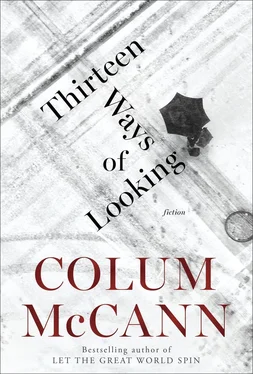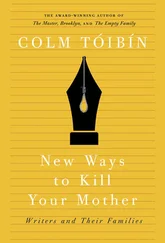Tomas clicked the remote and picked up the game stick. His fingers flitted over the buttons: the mastery of a pianist. She wondered if the parents had been gifted beyond the drunkenness, if one day they had looked out of high conservatory windows, or painted daring new canvases, or plied themselves in some poetic realm, against all the odds — sentimental, she knew, but worth the risk, hope against hope, a faint glimmer in the knit of neurons.
Christmas evening slipped away, gradations of dark outside the window.
At bedtime she read to him in Gaelic from a cycle of ancient Irish mythology. The myths were musical. His eyes fluttered. She waited. His turmoil. His anger. Night rages, the doctors called them.
She smoothed his hair, but Tomas jerked and his arm shot out. His elbow caught the side of her chin. She felt for blood. A thin smear of it appeared along her fingers. She touched her teeth with her tongue. Intact. Nothing too bad. Perhaps a bruise tomorrow. Something else to explain in the village store. Timpiste beag. A small accident, don’t worry. Ná bac leis.
She leaned over him and fixed her arms in a triangle so that he couldn’t bash his head off the wall.
Her breath moved the fringe of his hair. His skin was splotchy with small, dark acne. The onset of early adolescence. What might happen in the years to come, when the will of his body surpassed the strength of her own? How would she ever be able to hold him down? What discipline would she need, what method of restraint?
She moved closer to him, and his head dipped and touched the soft of her breast. Within a moment he was thrashing in the sheets again. His eyes opened. He ground his teeth. The look on his face: sometimes she wondered if the fear edged toward hatred.
She reached underneath the bed for a red hatbox. Inside lay a spongy black leather helmet. She lifted it out. Kilmacud Crokes Are Magic! was scrawled in silver marker along the side. Alan had worn it during his hurling days. If Tomas woke and began bashing again, it would protect him.
She lifted the back of his head and slipped it on, tucked back his hair and fastened the latch beneath his chin. Gently, she pried open his mouth and set a piece of fitted foam between his teeth so they wouldn’t crack.
Once he had bitten her finger while asleep, and she had given herself two stitches — an old trick she had learned from her mother. There was still a scar on her left forefinger: a small red scythe.
She fell asleep beside him in the single bed, woke momentarily unsure of where she was: the red digits on the alarm shining.
The phone, she thought. She must check the phone.
She went to the fridge for a bottle of white wine, stoked her bedroom fire, put Sviatoslav Richter on the stereo, settled the pillows, pulled a blanket to her chest, opened the bottle and poured. The wine sounded gently against the glass, a kindling to sleep.
—
IN THE MORNING Tomas was gone.
She rose sleepily at first, gathered the blanket tight around her neck. A reef of light broke through the bare sycamores. She turned the pillow to the cool side. She was surprised by the time. Nine o’clock. The wine still lay on her breath, the empty green bottle on the bedside table: she felt vaguely adulterous. She listened for movement. No video games, no television. A hard breeze moved through the cottage, an open window perhaps. She rose with the blanket around her. The cold floor stung her bare feet. She keyed the phone alive. It flickered an instant, beeped, fell dead again.
The living room was empty. She pushed open the door of his room, saw the hanging tongue of bedsheet and the helmet on the floor. She dropped the blanket from around her shoulders, checked under the bed, flung open the cupboard.
In the living room, the hook where the wetsuit had hung was empty.
The top half of the front door was still latched. The bottom half swung, panicky in the wind. She ducked under, wearing only her nightgown. The grass outside was brittle with frost. The cold seeped between her toes. His name was thrown back to her from among the treetops.
The sleeves of grass slapped hard against her shinbones. The wind played its tune over the pipes in the stone wall. She spied a quick movement at the edge of the cliff — a hunched figure darting down and away, bounding along the cliff. It appeared again, seconds later, as if out of the sea. A ram, the horns curled and sharp. It sped away along the fields, through a gap in the bushes.
Rebecca glanced down to the cove. No shoes on the rocks. No duffle coat. Nothing. Perhaps he had not come here at all. Good God, the wetsuit. She should never have bought it. Two sizes too big, just to save money.
She ran along the cliff, peered around the seastack. The wind blew fierce. The sea lay silver and black, an ancient, speckled mirror. Who was out there? Maybe a coast-guard boat. Or an early-morning kayaker. A fishing craft of some sort. The wind soughed off the Atlantic. Alan’s voice in her head. You bought him what? A wetsuit? Why, for crying out loud? How far might he swim? There were nets out there. He might get tangled.
— Tom-as!
Perhaps he might hear her. A ringing in his ears, maybe, a vibration of water to waken his eardrum.
She scanned the waves. Snap to. Pull yourself together for fucksake.
She could almost see herself from above as she turned back for the cottage: her nightdress, her bare feet, her hair uncoiled, the wet wind driving against her. No phone, no fucking phone. She would have to get the car. Drive to town. The Gardaí. Where was the station, anyway? Why didn’t she know? Which neighbors might be home? You bought him what? What sort of mother? How much wine did you drink? Fetal alcohol.
The wind bent the grass-blades. She stumbled forward over the low wall, into the garden, a sharp pain ripping through her ankle. At the back of the cottage the trees curtsied. The branches speckled the wall with shadows. The half-door swung on its hinges. She ducked under, into his bedroom again. Kilmacud Crokes Are Magic!
Still the phone did not work.
At the kitchen counter she keyed the computer alive. The screen flared — Tomas at six in Glendalough, blond hair, red shorts, shirtsleeves flapping as he sauntered through the grass toward the lake. She opened Skype, dialed the only number she knew by heart. Alan answered on the sixth ring. Jesus. What had she done? Was she out of her fucking mind? He would call the police, the coast guard, too, but it would take him three or four hours to drive from Dublin. Phone me when you find him. Hurry. Just find him. Fucksake, Rebecca. He hung up into a sudden, fierce silence.
When she closed Skype, the background picture of Tomas appeared once more.
She ran to her bedroom, struggled into her old wetsuit. It chafed her body, tugged across her chest, scraped hard against her neck.
A menace of clouds hung outside. She scanned the horizon. The distant islands lay humped and cetacean. Gray water, gray sky. Most likely he’d swum north. The currents were easier that way. They’d gone that direction in summer. Always close to shore. Reading the way the water flowed. Where it frothed against rocks, curved back on itself.
A small fishing boat trolled the far edge of the bay. Rebecca waved her hands — ridiculous, she knew — then scrambled down along the cliff face, her feet slipping in the moist track.
Halfway to the beach she stopped: Tomas’s tennis shoes lay there, neatly pointed toward the sea. How had she missed them earlier? She would remember this always, she knew: she turned the shoes around, as if at any moment he might step into them and return, plod up to the warm cottage.
No footprints in the sand: it was too coarse. No jacket, either. Had he left his duffle behind? Hypothermia. It could come on within minutes. She had bought the wetsuit so big. He was more likely to be exposed. Where would he stop? How long was he gone now? She had woken so late. Wine. She had drunk so much wine.
Читать дальше












